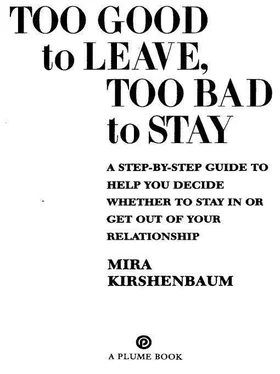Kirshenbaum, Mira - Too Good to Leave, Too Bad to Stay
Здесь есть возможность читать онлайн «Kirshenbaum, Mira - Too Good to Leave, Too Bad to Stay» весь текст электронной книги совершенно бесплатно (целиком полную версию без сокращений). В некоторых случаях можно слушать аудио, скачать через торрент в формате fb2 и присутствует краткое содержание. Жанр: Психология. Описание произведения, (предисловие) а так же отзывы посетителей доступны на портале библиотеки ЛибКат.
- Название:Too Good to Leave, Too Bad to Stay
- Автор:
- Жанр:
- Год:неизвестен
- ISBN:нет данных
- Рейтинг книги:3 / 5. Голосов: 1
-
Избранное:Добавить в избранное
- Отзывы:
-
Ваша оценка:
- 60
- 1
- 2
- 3
- 4
- 5
Too Good to Leave, Too Bad to Stay: краткое содержание, описание и аннотация
Предлагаем к чтению аннотацию, описание, краткое содержание или предисловие (зависит от того, что написал сам автор книги «Too Good to Leave, Too Bad to Stay»). Если вы не нашли необходимую информацию о книге — напишите в комментариях, мы постараемся отыскать её.
Too Good to Leave, Too Bad to Stay — читать онлайн бесплатно полную книгу (весь текст) целиком
Ниже представлен текст книги, разбитый по страницам. Система сохранения места последней прочитанной страницы, позволяет с удобством читать онлайн бесплатно книгу «Too Good to Leave, Too Bad to Stay», без необходимости каждый раз заново искать на чём Вы остановились. Поставьте закладку, и сможете в любой момент перейти на страницу, на которой закончили чтение.
Интервал:
Закладка:
The issue we’ve got to face here is where to draw the line between (1) sexual problems that frustrate and disappoint us and (2) sexual problems that make a relationship too bad to stay in. This chapter focuses on what it is about the physical part of your relationship that indicates a basic discord in the entire relationship, meaning you’ll be happy if you leave, as well as what provides evidence for the possibility that you’ll be happy if you stay.
The guidelines here are so specific that you might think I’d somehow left out all the other sexual problems I’ve just mentioned. Isn’t there some minimum frequency of lovemaking that means you’ll be happiest leaving? Isn’t there some level of sexual pleasure that’s so low that you’ll be happiest leaving? Isn’t there some degree of difference between you when it comes to sex that means you’ll be happiest leaving?
Sexual Guidelines
I didn’t leave any of this out. It’s just that the sexual part of your relationship doesn’t exist in isolation from the rest of your relationship. Every chapter of this book provides guidelines that point to issues that are all-important in determining what it is about sexual problems that makes a relationship too bad to stay in.
Take this sexual problem for example: a woman has trouble reaching orgasm with her partner. There’s nothing about this particular sexual problem that tells you that you should leave. The real issue is whether she can talk about it with her partner. It’s not trouble reaching orgasm but off-the-table-itis that determines whether she’d be happier staying or leaving.
People whose partners take off the table discussions about sexual matters are the ones who end up being miserable if they stay. People whose partners do not take sexual discussions off the table are much more likely to feel their relationship is too good to leave. Here’s why. Because their partners are open to talking about a problem like having trouble reaching orgasm, they’ll either make progress resolving their sexual problems or at least feel close to their partners and feel they’re working together to build a solid relationship.
The Bottom Line
Let me put it like this. Think about some couples who’ve grown old together. Being able to say “We could always talk about anything” buys you a lot of happiness, regardless of how many orgasms you’ve had. But if you have to say “We could never really talk about anything important,” then that buys a lot of disappointment and unhappiness, regardless of how many orgasms you’ve had.
Besides, being able to put things on the table can solve sexual problems. But good sex can never solve the problem of not being able to talk to each other.
And it’s like this for almost every issue in every chapter of this book.
Take the very first guideline in the book: that you’ll be happy leaving if things were never good when they were at their best. If things were good in general, then even if sex hasn’t been particularly good there’s a basis for hoping and connecting. If they were never any good anywhere, where’s there going to be a basis for their being good in sex?
Later on we’ll get into other issues, like mutual respect, the ways you and your partner are different, your partner’s having particular problems, intimacy, and many other issues. All of these have some bearing on whatever might not be working for you in your sexual relationship right now. The point is that sexual problems are not separate from relationship problems. It’s the same problems that make a relationship too bad to stay in that turn sexual difficulties into relationship-ending problems.
If there’s no reason why you’ll be happy leaving your relationship based on these problems, there’s certainly no reason to leave because of any specific sexual difficulty, other than what I deal with in this chapter.
A RED HERRING
Let’s get past an important source of confusion when it comes to bad sex and troubled relationships. There’s a high correlation between deteriorating relationships and a drop in the frequency of lovemaking. When people start fighting they stop making love.
But what causes what? Deteriorating relationships cause people to stop making love. This means that if you know things are going bad in a relationship you can predict that that couple isn’t sleeping together as much as they used to, and you’ll have a good chance of being right.
But you can’t flip this around. You can’t say that just because a couple isn’t making love all that much that things are going bad in the relationship. Here’s an analogy. If you know someone’s sick you can predict that there’s a good chance they’ll be in bed. But if you know someone’s in bed, you can’t predict they’re sick. Most people in bed are just sleeping.
And getting clear about what predicts what is important, because problems with lovemaking are a major reason people start wondering if their relationship is too bad to stay in. The bottom line is that if you and your partner have stopped making love as often as you used to or as you’d like to, it doesn’t necessarily mean there’s anything seriously wrong between you. It’s not a reason by itself for you to conclude you’ve got to leave or even that there’s anything necessarily wrong with your relationship.
It could be that the two of you are content not making love as much anymore. It could be that the two of you are mad at each other and that when your anger cools off your bed will get hot. It could be that the two of you need to talk but you haven’t for all kinds of reasons, including the fact that you’re so busy. It could be, believe it or not, that having kids in the house spooks you, and once they become horny teenagers who are out of the house a lot, the two of you will get horny again, too.
The point is that sex is like those canaries miners carry into a mine to see if the air is safe: it’s a highly sensitive responder to what’s happening in the atmosphere. Whatever’s going on with sex is far more likely to be a symptom than a disease. So if none of the guidelines in this book that say leave apply to you, then the odds are overwhelming that you’ll either be able to work out your sexual issues or you’ll be happy enough with things the way they are.
Now let’s get down to business. When does it mean a thing if it ain’t got that swing?
STEP #13: REACH OUT AND TOUCH SOMEONE
The physical side of a relationship is a huge area. There are whole libraries about what goes into good sex and how to get it. Couples argue constantly about when to make love and how to make love and what to do when making love. But where do you find, in the midst of the stormy and confusing sea of lovemaking, that one clear beacon that tells you there’s something so wrong between the two of you physically that your doubts are at an end and it really is best for you to leave?
This question is very basic.
Diagnostic question #13. Do both you and your partner want to touch each other and look forward to touching each other and make efforts to touch each other?
I’m talking about things as elemental as kissing, hugging, stroking, holding hands, rubbing a neck, putting a hand on a leg, and any other form of touching that goes on in committed relationships. And in any of these ways, do you feel that you want your partner to touch you, even if it’s just holding hands? Do you wish your partner touched you more often? Are you happy when your partner touches you now? Or do you feel that your partner gives you the creeps physically and that you actively and affirmatively do not want him to touch you?
Читать дальшеИнтервал:
Закладка:
Похожие книги на «Too Good to Leave, Too Bad to Stay»
Представляем Вашему вниманию похожие книги на «Too Good to Leave, Too Bad to Stay» списком для выбора. Мы отобрали схожую по названию и смыслу литературу в надежде предоставить читателям больше вариантов отыскать новые, интересные, ещё непрочитанные произведения.
Обсуждение, отзывы о книге «Too Good to Leave, Too Bad to Stay» и просто собственные мнения читателей. Оставьте ваши комментарии, напишите, что Вы думаете о произведении, его смысле или главных героях. Укажите что конкретно понравилось, а что нет, и почему Вы так считаете.












